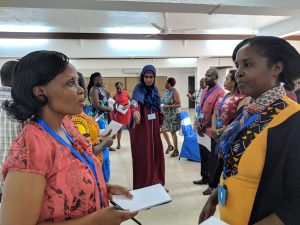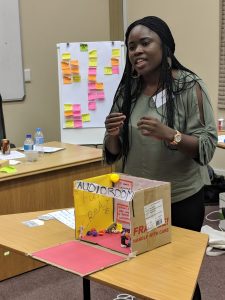EIFL photo: Kaltuma Sama, Head Librarian at KNLS / BuruBuru Public Library, lead the cascade training on re-designing library spaces in Mombasa, Kenya (2018)
In 2018-2020, EIFL (Electronic Information for Libraries – www.eifl.net) developed and implemented a new CPD strategy in four African countries. The strategy is sustainable, country-wide, and affordable, using skilled local trainers. In the previous two blog posts we presented the assessment tools and methods, and the activities designed to transform local librarians into skilled trainers. In this post, we will share the results and learnings from the implementation of the CPD programme in Kenya, Namibia, Zambia and Uganda, and will discuss the sustainability of the programme in the context of the COVID-19 pandemic.
All in all, 62 librarians and ICT officers completed the EIFL supported CPD programme in Kenya, Namibia, Uganda and Zambia, and are now being deployed in ongoing staff development for public libraries in their countries. By the end of 2020, the 62 trainers, who had learnt subjects critical to introduction of modern library services as well as generic training and facilitation skills, had cascaded their knowledge to over 1,400 librarians and other information professionals, including public, community, school, government librarians and volunteers, who run community libraries.
The training did not stop even during the pandemic – some trainers in Kenya managed to successfully adapt the training to an online format and continued enabling their peers with new skills. Namibia Library and Archives Service (NLAS) is also building an online training strategy, which includes monthly online training sessions on different topics. To support the network of trainers in all four countries, EIFL initiated virtual T-breaks, regular informal online meetings, which serve as an opportunity to learn new topics, discuss training experiences and share ideas with others.
To assess the impact of the programme, we applied an extensive methodology which consisted of: 1) Pre- and post- skills audits of local trainers to capture the improvement of their skills; 2) Feedback surveys immediately after each training session to evaluate how well the training was received by the participants; 3) Impact survey of the public librarians who participated in cascade training to find out what changes they had made in their libraries after the training.
The impact evaluation found that the CPD programme had positive outcomes for the local trainers. First of all, the programme improved the way the trainers perform their daily duties as library staff. It also made them better leaders and stronger advocates, which led to increased recognition of senior managers. As one of the trainers, Kaltuma Sama from Buruburu Library in Kenya, put it: “Continuous professional development has had such a huge impact on me as a person and also on my career. As a person, I have come out of my shell, I feel more confident than before. My career has also changed for the better, I have realized my potential as a leader too.” For details on the programmes and impact evaluation findings, please read the reports for Kenya and Namibia.
EIFL photo: During hands-on design thinking training Letta Shivute Librarian of Mariental Community and NLAS trainer showcased a prototype for new library service (2019)
However, the most important outcome of the CPD programme was the way in which it benefited librarians who participated in the cascade training conducted by the local trainers. For example, EIFL’s partner, NLAS, conducted an impact survey of all 51 public libraries where staff had participated in cascade training. The survey showed that all participants were very satisfied with the training and almost 90 percent of respondents found training to be very relevant for improvement of service delivery. After participating in the training, many libraries managed to start new services, for example weekly teenage games club (Luderitz Public Library), cooking club (Okahandja Library), creation of user interaction platform on WhatsApp (Otjomuise Public library), organizing training for street children (Omaheke Regional Library) and others.
The impact survey in Kenya revealed very similar results and showed that the cascade training had opened the eyes and shifted the mindsets of librarians, who became more proactive in seeking solutions to their libraries’ challenges, rather than waiting for solutions to be found by library authorities. Many libraries in Kenya also introduced changes or new services in their libraries, for example coding for children (Muranga Library), redesigned the junior section with input from the children on painting, murals, and quotes for the walls (Karatina Library), smart farming (Meru Library), lending mobile devices with educational material to children (Kibera Library), digital wellness for youth (Thika Library) and many others.
Reflecting on this CPD approach in general, EIFL and partners concluded that it is a sustainable and cost-effective way to strengthen CPD of public librarians in countries with fewer resources. This model can be replicated in other countries that have strong national institutions responsible for public library development, and in bigger public library systems that have several hundred staff. Our experience has also taught us that partners engaged in CPD initiatives need to have a shared vision for public libraries, and that the trainers need to buy into that vision with enthusiasm and pride. Finally, we learned that when an international organization (like EIFL) engages with an in-country partner (for example, NLAS), the more control the national partner and local librarians have over the project, the better the results. In fact, even before the project in each country ended, we knew that we were no longer needed. We could move on to future projects with smiles on our faces.
To find out about other activities of EIFL’s Public Library Innovation Programme, please visit: www.eifl.net/plip
***
Authors:
SUSAN SCHNUER, EIFL’s Public Library Innovation Programme, Capacity Building Manager
For over 27 years Susan Schnuer has trained librarians, in developing and transition economy countries, to be agents of change in their communities. Her passion is to identify and coach talented librarians, helping them to explore their potential as leaders and trainers in their communities. Her philosophy is to ‘tread lightly’ by co-developing training programmes that are tailored to meet the unique needs of librarians in different countries or regions.
UGNE LIPEIKAITE, EIFL’s Public Library Innovation Programme, Impact Manager
Ugne Lipeikaite’s expertise in developing impact evaluation methodologies and tools for measuring the outcomes of public library services has grown over a period of 15 years. Ugne has contributed to the design and implementation of major international research projects to measure the impact of public internet access in libraries and the role of libraries in providing connectivity and digital skills in communities. Ugne has developed training courses and trained public and community librarians in several countries in Africa on how to assess the needs of communities and the impact of library services.



